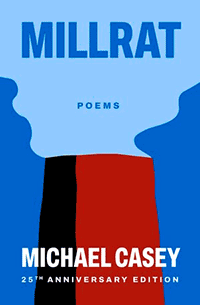 *
*
Review by Off the Shelf Correspondent Dennis Daly
Once upon a time multileveled manufacturing plants with attached smokestacks, called mills or factories grew like mushrooms around waterfalls and river bends. They attracted the able-bodied, both men and women, who sought financial independence and dignity. What these seekers found instead in this soot-filled urban culture was a rite of passage for some, a technological trap for others, and a graveyard or graveyard road for the unlucky remainder.

“Millrat”
Poems by
Michael Casey
25th Anniversary Edition
Loom PressAmesbury, Massachusetts www.loompress.com
ISBN: 978-1-7351689-7-5
Humor often got one through the interminable repetitions and the real dangers of modern machinery and toxic chemicals. Michael Casey knows this and nails the details of mill culture in his classic collection of poetic narratives entitled Millrat, which is being republished this year as a 25th Anniversary Edition by Loom Press.
Casey sets the mid-twentieth century atmosphere perfectly by opening with driving while under the influence, a poetic vignette on drunk driving, a common experience, regrettably, for many teenagers of that era. His first-person protagonist is a know-it-all snot-nosed kid, cruising with his friends in what is probably his first car. The car slams into a blinking yellow light, as cars do when driven by snot-nosed kids, who believe they have the grownup world figured out. Casey concludes the poem with just the right amount of irony and gritty dialect,
I get out and hide behind but
by this time I can see the flashing lights
and it was really something
the police cruiser goes around the rotary
takes the exit I took
and comes right to me
I was alone all my friends split
and they get me for leaving the scene
driving under the influence
and being a minor in possession
all kinds of stuff right?
I asked the guy found me
How’d you catch me?
He said he followed the leaking radiator
It leaked after the crash right?
fifty million dumb cops in the world
and this guy
has to be a genius
Throughout the collection Casey positions poems based on company posters intended to boost employee morale and promote work ethics. They effectively deliver their pop psychologies with unintended wry humor. Some are just laugh-out-loud funny. The first of these the poet titles Positivity Poster. Here is the heart of the piece,
…just some old fashioned ideas
avoiding waste
pride of craftsmen
work as a team
the worth of experience
all these add to the unequalled quality
at wholesale value
that make our patrons love us so
the new old fashioned
textile business
everyone in the mill
the dye house anyway
reading this stuff
would think of only one word bullshit
you can guess
what wall these posters were on
and without any effort at all
you memorize them
and with some creativity and even art
you write crude phrases
and drawings on them
it was a lot like a team effort
Respect for authority did not jump out at one upon entering the mill culture, and veterans of this work force were even less likely to defer to the demands of a foreman or manager type, at least immediately. Everyone, except new hires, had figured out their place in this society and defined it by the time it took for them to comply with any despotic order conveyed from above. Casey explains this phenomenon in his poem foreman,
Walter walked over to Alfred
and asked him
to mix up the soap
when he got the chance
and Alfred said
sure he’d do it
when he got the chance
but he never did it
so Walter walked over to Ronald
Ron why don’t ya make the soap up
when ya through what ya doin
and Ronald said
fuck you Walter
of course
Ronald went and mixed up the soap
when he got a chance
Between the mill and the neighborhoods that surrounded the mill no clear demarcation existed. Both of these rough-and-tumble inner-city zones fed into each other. Some factories doing government work had hard security to separate the two, like the General Electric in Lynn. Others, like Casey’s mill in Lowell allowed a freer interchange. The poet details a result of this overlap in his poem, the night the fight with Bill happened. The piece opens this way,
that same night
after they beat up Bill
they came back
don’t you know
shithead was mad
because Ray broke up the fight
and so he brought back his gang
a bunch of them
clean out the mill
that’s what he said
I’m gonna clean out the mill
the second shift upstairs
and the dye house
hears all the noise
ands runs down and runs up
and those assholes left fast enough
through the doors
out the windows
Forklifts are not complicated to drive. In any case most company bigwigs assume that their employees have certain basic skills and need not be bothered by training. Of course, postulations like this are terribly wrong and monumental accidents follow. In his poem, forklift driver, Casey laments the havoc that one driver, who guns his vehicle into the elevator door, can do.
He says,
do you know how important
that fuckin elevator is?
Gus is up there yelling all over
for yarn and this is holdin up the knitting room
the napping room and the whole place
gonna be backed up now
they tell me Gus is pissin and moanin up there
like he was pissin razor blades
Very few poets chronicle this essential part of our culture’s history, which many of us, or our parents, or our grandparents participated in. Poets who choose mill/factory life and that type of work experience as their subjects are very few indeed. Casey’s wry verse compositions delving into this blue-collar bastion enlighten and exhilarate. His use of local language is spot on. What Casey does, he does very, very well.


















Reader Comments